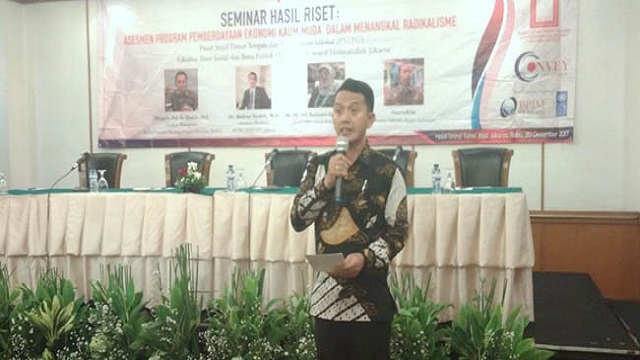PSTPG: Economic Programs for Youth is the Key to Overcoming Radicalism and Terrorism

Beware, Young People Today Look At Radicalism
June 8, 2018
Maarif Institute: Student Council Policy Needs to Be Strengthened as a Step Against Radicalism
June 8, 2018Economic programs for youth have a strategic role in overcoming radicalism and terrorism.
This was conveyed by the Executive Director of the Center for Middle East Studies and Global Peace (PSTPG) Badrus Sholeh after presenting the results of the PSTPG field research, Faculty of Social and Political Sciences, UIN Jakarta, Thursday (21/12).
According to Badrus, the government, civil society and religious organizations have an important contribution in the activities and economic empowerment of youth, including former terrorist convicts, former combatants and young people who are potential targets of terrorism and radicalism movements.
“The economic program also strengthens nationalism and social-security defense in border areas,” said Badrus.
The research findings also concluded that economic programs and activities for youth, ex-terror convicts and ex-combatants would strengthen their confidence in building independence, giving space in the process of disengagement from terrorist groups and past violence and reintegration in society.
Badrus explained based on the results of interviews with former terrorist convicts and former combatants that they had succeeded in releasing the pressure and influence of terrorist groups who were still trying to engage them in acts of violence and terrorism through economic activities both individually and through communities and cooperatives.
“Training on various skills, business capital, product innovation, and assistance for them will ensure the sustainability of their efforts to get out of the cycle of past violence and be fully integrated in society,” said Badrus.
Another finding in the research, said Badrus, was that youth economic programs were still dominated by government programs (National Terrorism Management Agency (BNPT), Ministry of Social Affairs, Ministry of Cooperatives and SMEs, Ministry of Public Works, Ministry of Manpower and Transmigration, and related agencies in area) on a short term basis.
“The role of stakeholders, local governments, and local and local entrepreneurs in economic activities for young people, former terrorists and former combatants was still limited,” said Badrus.
According to Badrus, the importance of economic programs in the long term and sustainability by involving the government and society together will create economic programs for young people that are stronger and have more permanent impact and impact. It is also urgent to ensure peace in post-conflict areas.
In the latest findings, Badrus revealed comprehensive and sustainable coordination and programs needed to be carried out together across ministries and agencies, central and regional governments, and stakeholders, entrepreneurs and religious organizations in the economic empowerment of young people and ex-terror convicts and former combatants.
“This recommendation was aimed at strengthening BNPT which would carry out the National Action Plan in 2018 by involving cross ministries and institutions,” said Badrus.
According to Badrus, the research findings were presented in the National Seminar on “Assessment of Economic Empowerment for Youth in Counteracting Radicalism” which was held on Wednesday (20/12) at the Grand Syahid Jaya Hotel, Jakarta.
The speakers who attended were Brigadier General Pol Ir. Hamli, M.E. (Director of Prevention BNPT), Dr. Siti Ruhaini Dzuhayatin, MA (Lecturer at UIN Sunan Kalijaga Yogyakarta) and Nurrohim (Founder of the Indonesian Master School). These seminars and studies were funded by Convey Indonesia managed by PPIM UIN Jakarta and UNDP.
Field research was conducted from 25 August to 25 September 2017 in five cities, five provinces, namely Nunukan, North Kalimantan; Poso, Central Sulawesi; Solo, Central Java; Lamongan, East Java, and Medan, North Sumatra. The research was conducted using qualitative methods, in-depth interviews with about 100 respondents, FGD, observation and analysis of government documents and local and central institutions.




